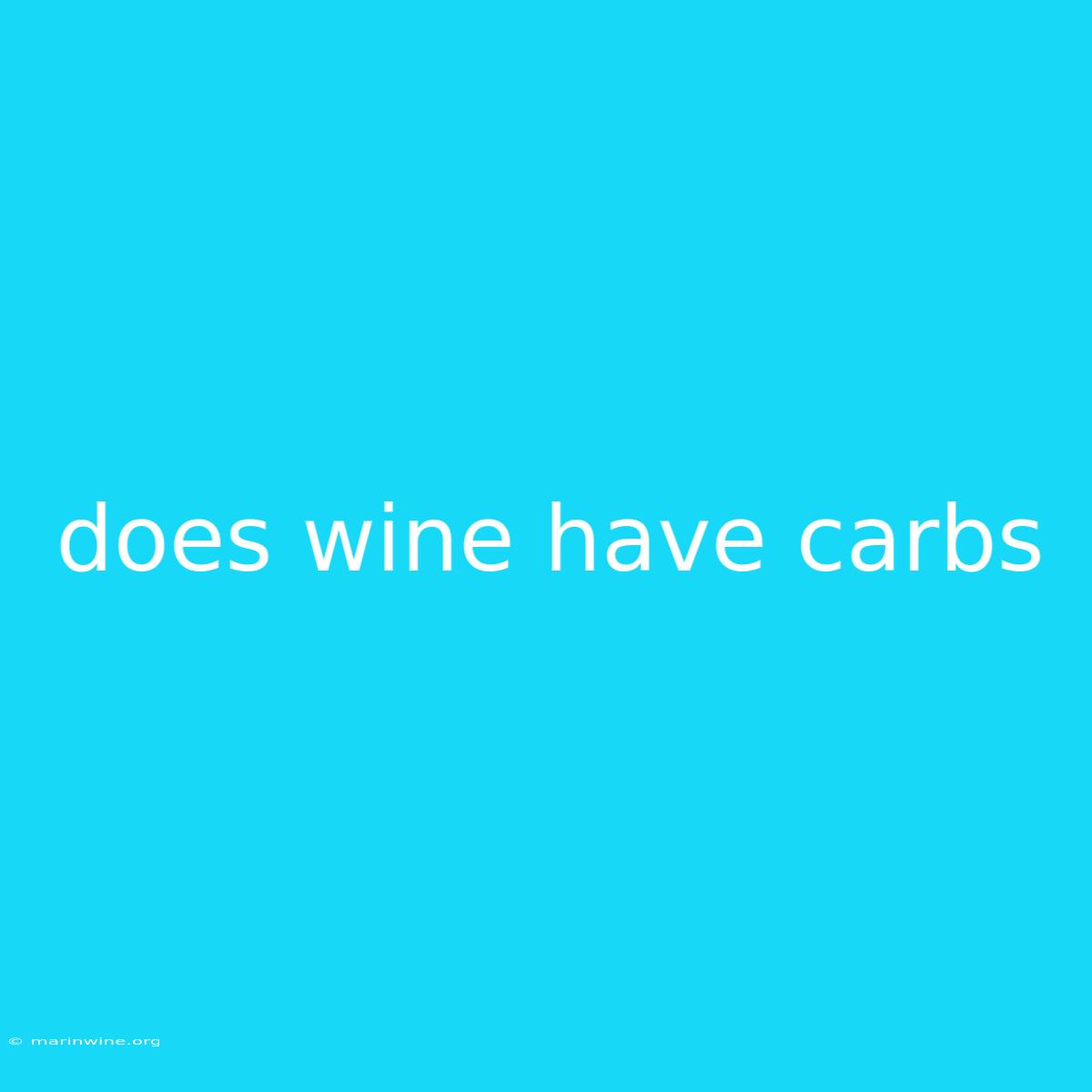Does Wine Have Carbs? Uncorking the Truth About Sugar in Your Favorite Drink
Editor's Note: You've probably heard that wine is "dry" and "low in carbs," but is that really true? The answer is surprisingly complex, and it depends on the type of wine you're enjoying.
Why It Matters: Understanding the carb content of wine is essential for those following a low-carb diet, managing their blood sugar levels, or simply seeking a healthier choice. This article delves into the world of wine and its carbohydrate content, providing a clearer understanding of what you're consuming.
Key Takeaways of Wine Carbs:
| Feature | Details |
|---|---|
| Carb Content | Varies significantly by wine type and production |
| Sugar Content | Ranges from 0 to 10 grams per serving |
| Types of Wine | Dry wines typically have lower carbs, while sweet wines have higher carbs |
| Impact on Diet | Consider wine's carb content when planning meals |
Does Wine Have Carbs? Uncorking the Secrets
Wine is essentially fermented grape juice. During fermentation, yeast converts the grape's natural sugars into alcohol and carbon dioxide. However, not all sugar is converted. This remaining sugar, known as residual sugar, is what contributes to a wine's sweetness and, consequently, its carbohydrate content.
Residual Sugar: The Key to Wine's Carb Content
Residual sugar is the primary factor determining a wine's carbohydrate content. The amount of residual sugar varies depending on the:
- Type of grape: Some grapes are naturally higher in sugar than others.
- Winemaking techniques: Winemakers can control the fermentation process to leave more or less residual sugar.
- Wine style: "Dry" wines, such as Cabernet Sauvignon and Pinot Noir, have very little residual sugar, making them low in carbs. "Sweet" wines, like Riesling and Moscato, are intentionally made with higher residual sugar, resulting in a greater carbohydrate content.
Exploring Different Wine Styles and Carbs
Dry Wines: Dry wines are generally low in carbs due to their minimal residual sugar. This makes them a potentially good choice for those watching their carbohydrate intake.
Sweet Wines: Sweet wines are higher in carbs because of their higher residual sugar content. This is due to the winemaking process where fermentation is halted before all the sugar is converted to alcohol. These wines typically have a higher sugar content, leading to a higher carbohydrate count.
The Impact of Wine on Diet
While wine can be enjoyed as part of a healthy diet, understanding its carbohydrate content is essential for those managing their sugar intake. Here are some important considerations:
- Low-Carb Diets: Individuals following a low-carb diet should be mindful of the type of wine they choose, opting for dry wines with minimal residual sugar.
- Blood Sugar Levels: Individuals with diabetes or insulin resistance should be cautious about sweet wines, as their high sugar content can significantly impact blood sugar levels.
- Portion Control: Regardless of the wine type, moderation is key. A standard serving size is 4-5 ounces, which typically contains around 1-2 grams of carbs.
FAQ
Q: What are the best low-carb wine options?
A: Dry red wines like Cabernet Sauvignon, Pinot Noir, and Merlot, as well as dry white wines like Sauvignon Blanc and Pinot Grigio, are typically lower in carbs.
Q: Does red wine have more carbs than white wine?
**A: ** It depends on the wine's sweetness level. Dry red wines often have lower residual sugar and therefore fewer carbs than sweet white wines like Moscato.
Q: Does sparkling wine have carbs?
A: Yes, sparkling wine can have carbs, but the amount varies depending on the type. Dry sparkling wines like Brut have lower carb content, while sweeter styles like Moscato d'Asti are higher in carbs.
Q: Are wine spritzers low in carbs?
A: Not necessarily. Wine spritzers often contain added juices and sodas, which contribute to the carb content. Choose low-sugar alternatives like sparkling water for a lower-carb option.
Q: Can I drink wine on a keto diet?
A: It's generally recommended to avoid wine on a strict keto diet due to its carbohydrate content, even dry wines. However, small amounts of dry wines may be acceptable in moderate keto diets, as long as they fit within your daily carbohydrate intake.
Tips for Enjoying Wine While Managing Carbs
- Choose dry wines: Opt for dry red or white wines with minimal residual sugar for a lower-carb option.
- Read wine labels: Pay attention to the description and "residual sugar" content on wine labels.
- Moderate your intake: Enjoy wine in moderation and consider a standard serving size of 4-5 ounces.
- Pair wine with meals: Enjoy wine with meals to help slow down the absorption of carbs.
- Consider alternatives: Explore low-carb alcohol alternatives like vodka, gin, or tequila.
Summary by Wine Carbs
This article has unveiled the complexity of wine's carbohydrate content, highlighting the importance of considering the wine type and residual sugar content. By understanding the factors that contribute to wine's carbs, you can make informed choices for your dietary needs and enjoy your favorite beverage responsibly.
Closing Message: While wine can be a delightful addition to any occasion, understanding its carbohydrate content is crucial for making informed choices. By being mindful of your intake and choosing wisely, you can enjoy a glass of wine while staying aligned with your dietary goals.

